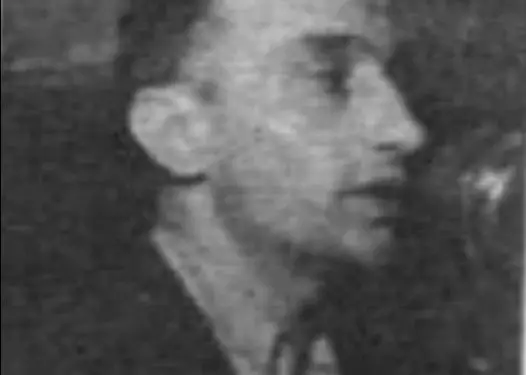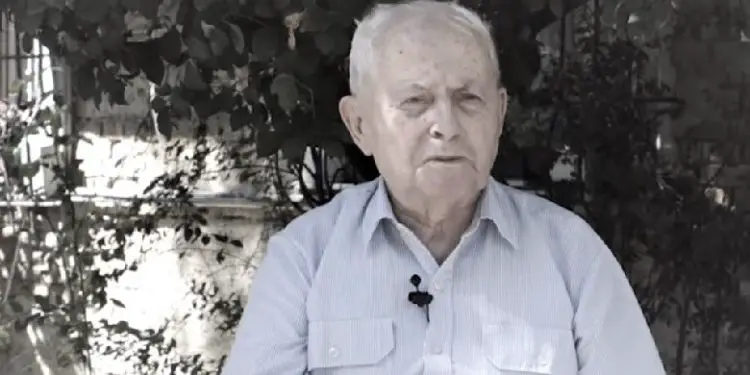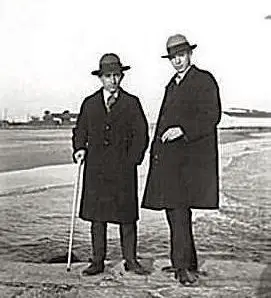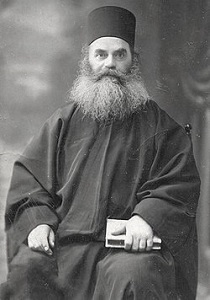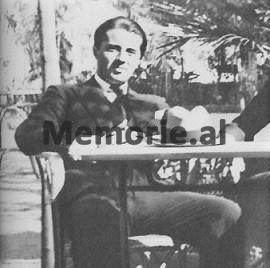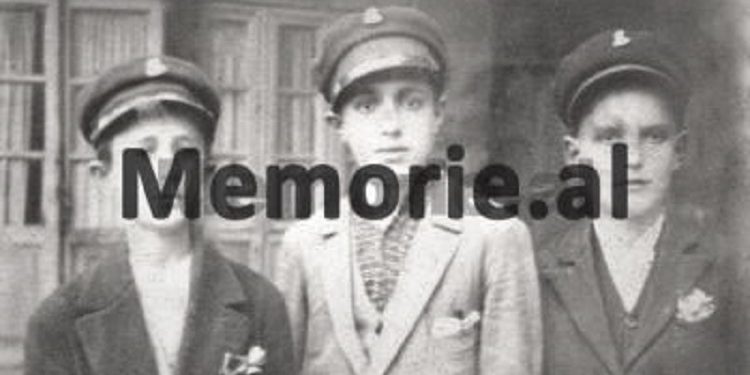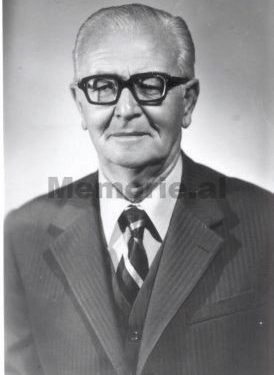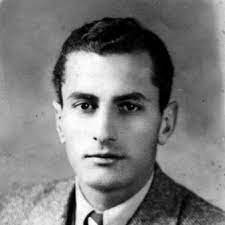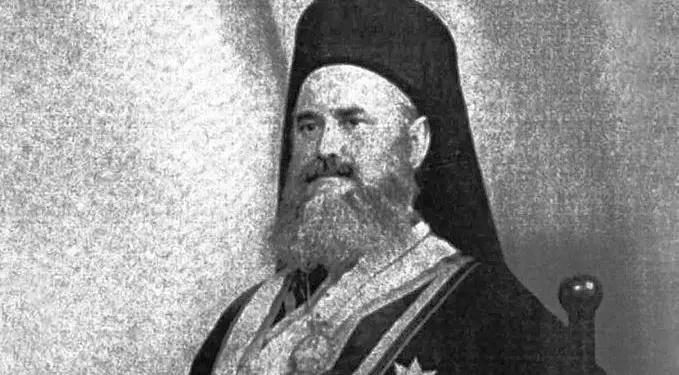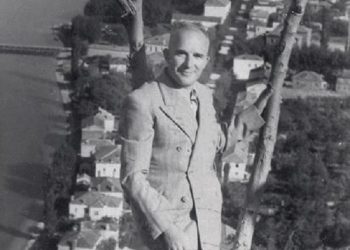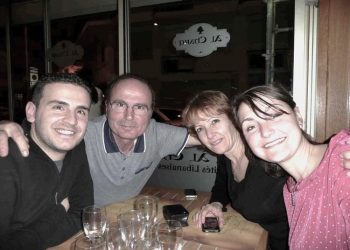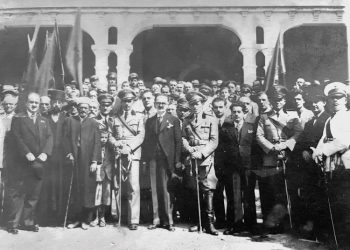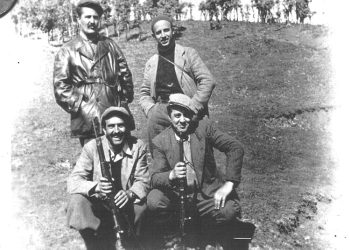From Agim Musta
Part fourteen
Memorie.al / On the fourth anniversary of the passing away of the well-known historian, researcher, writer and publicist Agim Musta, (July 24, 2019), former political prisoner, his daughters Elizabeta and Suela, gave him the right to exclusivity for the publication, by the online media Memorie.al, of one of the author’s most prominent publications, such as the ‘Black Book of Albanian Communism’. This work contains numerous data, evidence, facts, statistics and arguments unknown to the general public, on communist crimes and terror in Albania, especially against intellectuals, in the period 1945-1991. The publication for the first time of parts of this book is also the realization of one of the bequests of the historian Agim Musta, who, from the beginning of 1991 until he passed away, for nearly three decades was engaged with all his powers, working to raise collective memory, through book publications and publications in the daily press. All that voluminous work of Mr. Agim Musta, concretized in several books, is a contribution of great value to the disclosure of the crimes of the communist regime of Enver Hoxha and his successor, Ramiz Alia. A good part of the publications of Mr. Agim Musta, is also translated into English. Thanking the two daughters of the late Musta, who chose Memorie.al, to commemorate their father, from today we are starting the publication, part by part, of the “Black Book of Albanian Communism”.
Continues from last issue
-Portraits of fellow sufferers-
(1945-1991)
- Professor Foto Bala
I had heard about Professor Foto Bala before I knew him personally from my friends who had attended the Gjirokastra high school in 1945-46, where he taught them French. I knew that he was from Vunoi i Himara and his father, Dhimitër Bala, had been an ardent fanatic and prefect of Gjirokastra, during the years 1920-24. With the arrival of Zog in power, in December 1924, Dhimitri emigrated abroad and returned in 1939, like many of his friends.
In 1945, Dhimitër Bala, at the age of 65, was sentenced to death and executed by the communist dictatorship. I met Foton in 1962, in the Burrel prison, where he was serving his sentence since 1947. We quickly became friends with each other, because our profession and anti-communist ideal connected us.
We were in a box together and the beds were attached. He was a cultured man, he knew three foreign languages: French, Italian, Greek, and he had a deep knowledge of philosophy and world history. He graduated in philosophy at the University of Montpellier and worked at the French Lyceum of Korça. He had been apolitical before he was sentenced.
In the conversations we had, he told me about his past, which he considered fatal: “In Gjirokastër, I have known Enver Hoxha since I was 12 years old. We were the same age and together we went to Korça to continue high school. He had a diabolical wit and was perverse. I slept with him in the same room, but I still hadn’t gotten to know him properly. When we finished high school, we were given a state scholarship to continue our higher studies in Montpellier, France, although I was with a political fugitive father. Here, this was Zog’s regime, which some cheeky bastards call an obscurantist dictatorship.
Even in Montpellier I stayed in a room with Enver. I broke up with him when he stayed in the classroom and was forced to leave. He was unfaithful. He worked all kinds of tricks on me, which I understood late. How many times I had cursed and spat in his face, but he would growl. He was brazen. When he left France, I said that I got rid of him, but fate reunited me again at the Liceu of Korça, during the thirties. It was not good for me, because I was a graduate, appointed professor, with a basic salary of 220 gold francs per month, while he was paid by teaching hours, 130 francs.
In Korça, he mixed with all kinds of vagabonds and immoral women. He had contracted venereal disease four times. In a trial held in Brussels, against a group of Soviet agents, in 1939, the name of Enver Hoxha was mentioned several times by the defendants and by the Belgian prosecutor. In December 1944, I was in Tirana. Fejzi Dika and Nonda Bulka came to my house and proposed that I pay a visit to Enver Hoxha, who lived in the “Dajti” hotel. At first I refused. I knew better than they who Enver was, but, as they insisted, I agreed and the three of us left for the dictator’s headquarters. His adjutant, a wild-faced young captain, met us in the saloon. We told him that we were former comrades of the Commander-in-Chief and gave him our names.
After a few minutes the captain came back more sullen than he was and told us that; the commander would not wait for us, because he was busy with work. The blood rushed to my head. E! I told my friends when we left the “Dajti” hotel; did you find out who Enver Hoxha is?! Alas, in what hands have this people fallen! They were as if shocked and did not open their mouths. Fejziu was shaking with rage and constantly spitting on the ground. Another time, talking to Foton about the causes of the victory of communism in Albania, he listed as factor no. 1, the generosity of the Quisling authorities towards the communists and counted dozens of facts, that as high functionaries, they helped the communist movement.
“I will tell you a fact, where I was an eyewitness”
– He told me, frowning on his face:
“It was the summer of 1943. My father, Dhimitri, at that time, had the function of quaestor (chief of police) of the prefecture of Durrës. I had gone there, together with my family, to spend the holidays. One day, when I was in father’s office, his orderly entered, and announced that Enver Sazani, Shefqet Beja and Sheh Karbunara wanted to see the quaestor. Father ordered them to enter, and when they entered, he introduced me to them. The waiter brought coffee and Turkish delights welcome. From the manner of the greeting, it seemed they had known each other for a long time. Without a hint of timidity, the anti-Axis, Rome-Berlin-Tokyo and pro-Allies political talk began.
The battle of Kursk, where the Germans had left hundreds of destroyed tanks and other victories of the Red Army were spoken of with admiration. There was enthusiastic talk about a show on Radio London, where Myslym Peza, Mestan Ujanik and other leaders of the partisan squads were praised. In the police quaestor’s office, there was talk of an illegal base of the Communist Party. Towards the end of the conversation, Dr. Enver Sazani, member of the Presidency of the National Liberation Council for the prefecture of Durrës, took an official position and addressed his father with the following thanks: “Mr. Dhimitër! You must go to the Carabinieri Command, for the release of a driver of arrested yesterday at the Dajlani Bridge by the Italian Carabinieri, under whose seat 10 pistols and 500 rounds of ammunition were found.
We are afraid that the Italians will use torture against the driver and he will expose the friends of Qarkor, who are related to him, please intervene as soon as possible, giving the case an ordinary character, that the weapons were allegedly sold for personal profit and were bought by unknown persons”. In vain, the father tried to convince them that his powers did not allow him to interfere with the Carabinieri Command and that its commander, for the prefecture of Durrës, was an Italian lieutenant colonel, very rigorous and incorruptible. Then Shefqet Beja got up and said to her father:
“You will fulfill this task, Mr. Dhimitër, at any cost. This is a test stone for your devotion to the people, to the homeland!” After many debates, the father gave in and agreed to go to the Carabinieri Command, for intervention in favor of the arrested driver. After receiving the promise from Dhimitri, they left, greeting me as well. During the whole conversation, I never opened my mouth. I was so puffed up against my father. I looked forward to their departure. And, with him gone, I say to my heart:
“What are you doing, father, are you in your right mind?! How do you accept that the representatives of the National Liberation Party put pressure on you in your office and speak openly against the Axis and the Allies?! How do you accept to mediate for the release from prison of a communist terrorist? I don’t understand you father, why are you behaving like this”?!
“But what should I do, my son? How can I arrest the Albanians and hand them over to the Italian invaders?! God forbid such a thing! I know everything: who are the communists, where are their bases, where they hold meetings, but I will never seriously lay hands on them. It is the occupier in the middle”. “Yes, the communists will not honor you, what you do for them today. They will punish you, if they take power”.
“It’s okay, son, let them punish us. The people know what we do, the Motherland knows, God knows. We, this is what our heart and upbringing dictates, never sell the Albanian to a foreigner, no matter how much wicked as it may be”. – said my father, lowering his eyes with a sadness that he had never seen in my life.
Although many witnesses appeared at the trial, which proved with convincing facts about the help he had given to the National Liberation Movement, he was sentenced to death and shot, like many of his friends”.
“In 1945, I was appointed a professor at the Gjirokastra high school, monitoring me day and night, until I was arrested in the middle of 1946. I was accused of having created the group of Neoballists, of being connected to the Anglo-American missions and full of nonsense of this the kind, which not only we had done, but we had not even dreamed of. They sent me to Tirana. At first they treated me gently, but when I refused to affirm what they were serving me, the “gentile” investigators started the torture, by Mihallaq Zeçishti, Stavri Xhara, Kadri Hazbiu, and others, that I am horrified even today, when I remember them. I told them that I was ready to accept whatever they wanted, as long as they stop the torture.
Their eyes lit up and they immediately began to fill the minutes, writing that I was a member of the Presidency of the Neoballist Committee, that I was an Anglo-American-French agent, that we would kill women, old people and children, even Christ and Muhammad, if they were alive and full of disgusting nonsense that only the minds of communists can invent. The late Enver Sazani, with whom I spent several days in a cell, told me that the investigator Mihallaq Ziçishti had burned his eyes with a cigarette, until he had received the statement that he was an Anglo-American-French agent.
Doctor Sazani told me in those last days of his life that Mihallaq, the hyena, had told him that these statements were wanted by his Yugoslav comrades, to unmask imperialism, but he did not tell him that this was one of the many Slavic plans -communist, for the disappearance of our intelligence, implemented with servility by Enver Hoxha and his executioners. Many of those who refused to become “whistles”, and many of those who did, were sentenced to life imprisonment, to suffer like Sisyphus of mythology.
I have spent 17 years in prison, so far, and God knows how much more I will suffer. A few months ago, I wrote a letter to Enver, to forgive me the remaining sentence, just to find my mother alive. I wanted to bury him with my own hands, because I didn’t even know my father’s grave, but Katili opposed my request and gave an order to deport my family to Tërbuf. That’s how kind-hearted Enver Hoxha is. And Timur Lengu would envy him”.
Professor Foto Bala was released from Burrel prison after 19 years of suffering, with a collection of diseases, but he survived. It revived immeasurably when the dictator died. “Now let me die,” he told me, “I’m happy.” He lived until the beginning of 1991, seeing the dawn of democracy. In the dictator’s book; “When the foundations were laid”, he writes that Foto Bala became a collaborator of the Italian fascists and for this he received the well-deserved punishment from the people’s court. O tempo! O sea!
- Archbishop of Albania, Visarion Xhuvani
I had only been in the Burrel prison for two weeks, when in the evening, accompanied by the warden to the WC, I noticed in the background of the corridor, a man with black satin, face and hair as white as snow, a living Abbot Faria, who walked bent over from the weight of years and suffering.
Was it a hallucination, or the shadow of Abbot Faria who escaped from the Castle of Ifa and came to the prison-hell of Burrel, where for every moment the lines of the great Dante came to mind: “Lose all hope, you who enter… .. It was strictly forbidden to ask the guard, but look and pass!
In my adolescence, when I had read “The Count of Monte Cristo”, Abbé Farie, it was embedded in my brain and I often see him in my dreams, and now, what I saw in the dark corridors of the prison, was no longer a dream. It was a reality. After a month, when I was taken out of the cell and the guard escorted me to cell no. 9, to the door of cell no. 7, I saw Abat alive, who resembled Faria like two drops of water, but more handsome, more manly and nobler than the French Abbot.
And he looked at me and whispered something, when the guard turned his arms, made a cross in my direction. I asked about the co-sufferers and they told me that it was Visarion Xhuvani, the former Archbishop of the Autocephalous Orthodox Church of Albania, who for 16 years, suffered punishment in this hell of the Enverist dictatorship. I wanted to know his grace. Professor Foto Bala gave me his word that he would fulfill my wish. After a few days, when we were going out to Orr, we sneaked into cabin no. 7, together with Foton. Visarion had been unable to agree for days. It was impossible and he stood in the kaush, praying silently. All the fellow sufferers respected and helped him as much as they could, this apostle of Christianity, whom the regime of the communist tyrant had punished without any guilt.
“Don’t worry, my son! – Visarion told me, – good days will definitely come. God will not be patient for long. You are young and you will see them, while I…”- and raised his hands up, towards the sky. There was something divine in his appearance, which imposed silence and respect. This was the first and last meeting with the venerable Dhespot. After a month, on November 26, 1962, Vissarion was released by decree of especially of the Presidium. Why did the dictator release the Archbishop before serving his sentence?!
To ease the conscience burdened by the weight of crimes, or? Enigma! When he got out of prison, he left everything. He took only the black scarf with him, leaving an indelible image among the fellow sufferers. He did not forget his prison mates for a moment and sent those letters from the Monastery of St. John in Elbasan, where he spent the last years of his life, like a true hermit.
Professor Bala, with whom the Archbishop corresponded, told me that Visarioni was born in Elbasan, in the “Kala” neighborhood, in 1890, in a patriotic family, which had nothing to do with the family of Aleksandër Xhuvan. In primary school, he was lucky to have the patriot, the great linguist, his cousin, Kristoforidi, as a teacher. He completed high school and high school in Athens, at the Faculty of Theology, with excellent grades.
He served as a clergyman in Sofia and Cetina. In 1919, as Bishop of the Orthodox Church, he gave the first mass in the Albanian language in his beloved Elbasan. That day turned into a powerful popular manifestation and echoed throughout Albania. The name of Visarion Xhuvan, became a symbol for the establishment of the Autocephalous Church of Albania, for the Autocephalous Orthodox Church of Albania, severely hitting the evil intentions of the Istanbul Patriarchate.
With his titanic efforts, he imposed himself on the Patriarchate, and the latter, after many hesitations, recognized him as the Bishop of Albania in 1923. He was elected a deputy of the Albanian Parliament in the period 1920-1924 and with his word; he became an ardent defender of democracy. In 1929, he was elected Archbishop of Albania and fought with flesh and soul for the nationalization of the Albanian Orthodox Church.
The communist dictatorship found Visarion Bishop of Vlora. He was put under strict surveillance, until he was arrested in 1946. The red executioners did not stop at all before this outstanding patriot and cleric. They tortured him physically and mentally in the most barbaric way. They labored in vain to get him to confess his “crimes,” and when they saw that every kind of torture used against him did not bend this Stoic of Christianity, they condemned that patriot, democrat, to life imprisonment without any argument and prominent cleric.
During the entire time of serving the sentence, he became the spiritual “Father” of his fellow sufferers, instilling faith in them that the dictatorship would be overthrown, freedom would come and democracy would win. He died in the Monastery of St. John, near Elbasan, at the age of 76, alone and in complete misery. Memorie.al
The next issue follows




